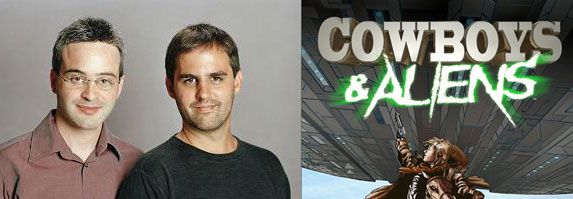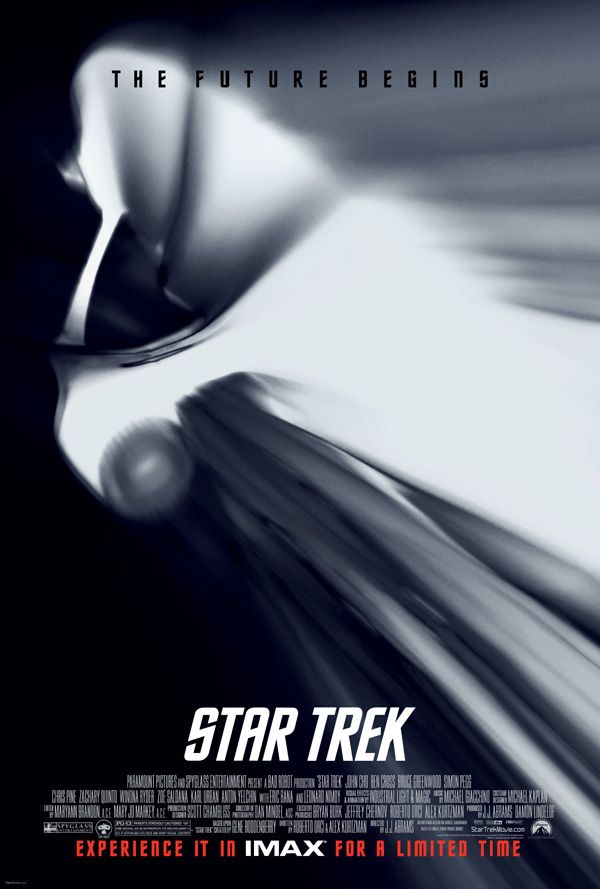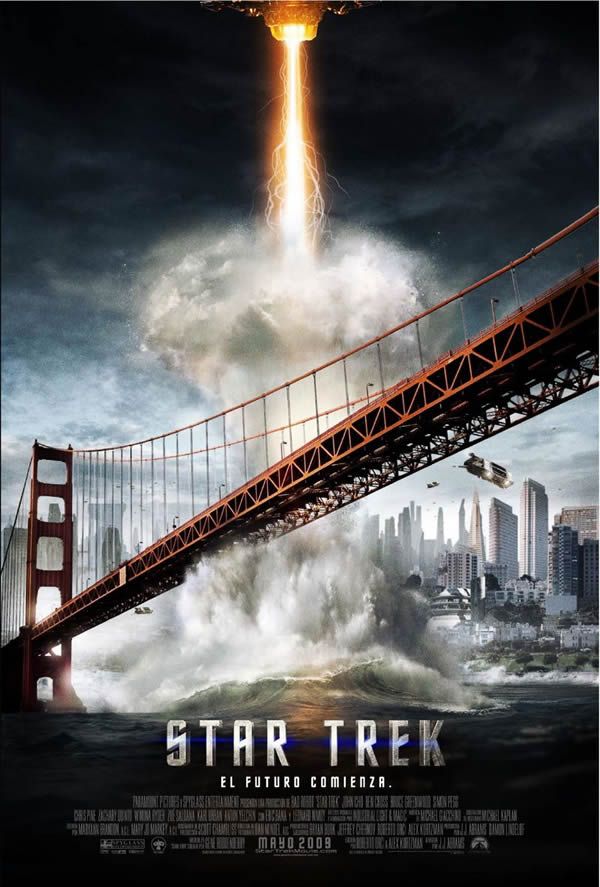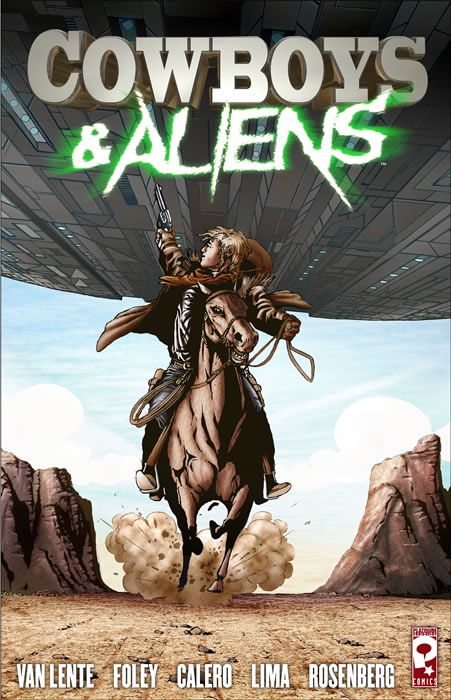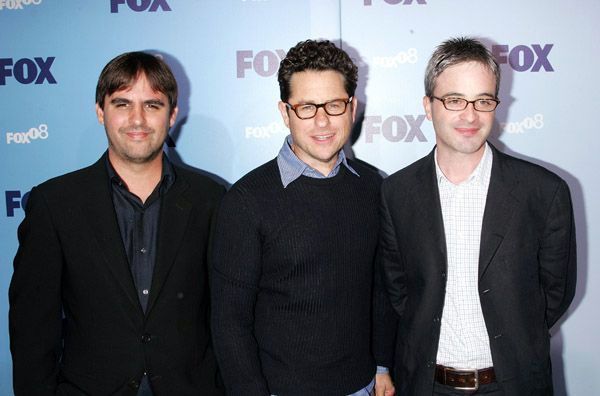At a press day for the upcoming DVD releases of both Star Trek (out on DVD and Blu-Ray on November 17th) and Transformers: Revenge of the Fallen (out on DVD and Blu-Ray on October 20th) writer/producers Robert Orci and Alex Kurtzman took time to preview their upcoming release schedule.
While still trying to break stories for the Star Trek sequel, the twosome are pushing their next project, Cowboys and Aliens, into production with director Jon Favreau, are working on developing a View-Master film, and also oversee at least a couple episodes of the television series Fringe each season. What they had to say is after the jump:
And in case you missed it, we posted a new interview with J.J. Abrams from the same event here. He talked about the "Star Trek" sequel, "Mission Impossible 4", "Fringe", and all the other stuff he's working on. Here's Bob and Alex:
Question: When you're looking at a sequel, is it more interesting for you to come up with a brand new adventure for this characters, or to reinterpret a previous situation?
Alex: Every franchise has a different need, so you have to look at them differently, based on whatever the mandate is. You need to be able to not have seen the first movie to appreciate the second one. But, for us, it's always about going back to the sequels that we loved as kids and asking ourselves why we loved them.
So, there's Empire Strikes Back, Superman 2, Aliens, Terminator 2, Star Trek 2. What do all those movies have in common? Well, they're amazing stories, all on their own. You didn't have to see the first movie. And, there was some incredible, emotional test of character, in all of those movies. Superman has to give up his powers for love. The Spock and Kirk relationship is tested by Khan. Ripley finds a daughter. All of those things are such big ideas, in and of themselves, and you really can't tell those stories in movie #1 because movie #1 is very much about establishing a world.
Bob: We'd want some kind of similar balance with the second one.
Are there any elements from the later series that you might want to throw into the next film?
Bob: I think we'd think about it, just because we do love The Next Generation, but I think our instinct would be to first look at the original series before we considered that. But, all that is on the table for us.
Is there a possibility of doing a Star Trek 2 and 3, back-to-back?
Alex: It's very, very important to us to make sure that each movie is good, not "Hey, let's do as many as possible." We feel like we've inherited this incredible honor and this mantle of Star Trek, and the most important thing is to make sure that we're protecting that first.
So, if the studio wants more than one, great. But, our thinking is going to be very much about the story and whether the story prescribes that there will be more than one. Part of what is great about Star Trek is that it's a continuing adventure, so you naturally think that there will be many, hopefully, but we only focus on what comes next, and then build off of that. Right now, we're not thinking specifically about making 2 and 3. It may come up, but it's not where our heads are at right now.
Where are you with the story and script for the Star Trek sequel?
Bob: We're still just brainstorming, internally. We're going to get together soon and see what happens, and start putting it together.
So, you haven't figured out a story yet?
Bob: No.
Is it true that you will you be using torture as an allegory for the next film?
Bob: The torture thing was just a for instance. Someone asked, "Modern day issues?," and we said, "Yeah, sure, modern day issues." But, we're not doing a story about Gitmo. I read on some site that it was going to be about Guantanamo Bay. But, now that we've established the characters, we can have a more philosophical allegory, where what's happening in the future represents our world, like the best versions of it in the '60's did with women's rights and racial equality.
As fans of the original series and mythology, have you given any thought as to how you could incorporate Khan?
Alex: Where we're starting is, "Okay, where are our characters now? What are interesting complications that we can put in their lives? What feels like an organic emotional place for us to get to? How do we want to test them?" And then, you look at everything and start asking, "Who would be the best foe?"
Bob: There are mental exercises we play. You can't be a fan of this and not sit around and wonder.
Alex: But, the short answer is that we haven't landed on anybody yet.
Have you guys decided how much time will have passed between the first Star Trek film and the sequel? Are they still going to be new on the job, or will they have some experience?
Bob: We're actually debating that.
Alex: We don't have an answer yet.
Now that Cowboys and Aliens script is a go, how is that film developing and how is it to work with Jon Favreau?
Alex: It's the greatest.
Bob: We just started and we're getting along really well. We've sent ourselves back to school and we're watching Westerns together and analyzing them. We're just getting into it.
Have you found any good references?
Alex: Oh, yeah.
Bob: We just watched The Searchers last.
Alex: We had a lot of these Westerns in our head, but Jon is an incredible fountain of Western knowledge.
Bob: And, Star Trek was originally pitched as a space Western, anyway, so it was a nice lead up to this, for us.
Alex: I think Jon also comes from a very similar emotional place and, because he's an actor, he knows what plays and what doesn't play very quickly. We're having an unbelievably good time working with him.
Why have you decided not to be involved with Transformers 3?
Bob: We've been working on Transformers longer than I was in college. I feel like we have our degree in Transformers now.
Alex: The franchise is so wonderful that it deserves to be fresh, all the time. We just felt like we'd given it a lot and didn't have an insight for where to go with it next, and said, "You should do it right."
Bob: The studio was nice to say, "Oh, yeah, if you guys want to come back than come back." But, we never want to do that, unless we have an idea. We always think the best idea should win, and that means opening it up to everybody.
What is your involvement with Fringe this season?
Bob: We come in about once a week, and then we'll oversee two or three episodes during the season, where we work with another writer. We all divvy up overseeing part of the staff, to generate episodes. We all sat around for weeks, early on in this year, to figure out what the overall season would be, and then we check in once or twice a week and oversee a couple episodes.
Does J.J. Abrams have the same schedule?
Bob: Yeah. We switch off. He'll check in and oversee another episode when we're not around. That way, there's a constant stream of us consulting and helping the great showrunners that we have, Jeff Pinkner and Joel Wyman.
Alex: The credit really goes to them, honestly. Jeff and Joel are carrying the show right now, in an amazing way. They're in there seven days a week. They're there all the time, 24 hours a day.
Do you have an update on the View-Master film
Alex: We've read a lot of the wildly cynical response to that. What I'll say is that some toys should be movies and some toys should not be movies, and I'd like to believe we know the difference between those things. The movies that work, work when there's a story there that you could take the toy out of, but then, when you put the toy in, it becomes an even more amazing experience, for whatever reason. Brad Kane, who was a writer for us on Fringe, came to us with an amazing idea, that had absolutely nothing to do with View-Master. We loved it and thought it was fantastic.
Bob: But, we said, "It's missing one thing. I don't know what that thing could be."
Alex: And, along came View-Master, and it sounded like the perfect marriage of ideas. But, it's because we started with a story that felt like it could be told, all on its own, before that came along. So, it's like, "Bring it on!" If you want to be cynical about View-Master, great 'cause we're so confidence in where it's going to end up going that we feel like there's nowhere to go, but up.
So, is that already through the pitch phase?
Alex: Yes. Brad is finishing a script.
Is it something where that object used as a device in the movie?
Alex: Perhaps.
Bob: Spielberg actually told us once that his first draft story of E.T. didn't have an alien in it. It was a family drama about a kid missing his father, and E.T. was born from that. And, that's always stuck in our minds. You've got to be able to take out the thing.
And in case you missed it, we posted a new interview with J.J. Abrams from the same event here. He talked about the "Star Trek" sequel, "Mission Impossible 4", "Fringe", and all the other stuff he's working on.


